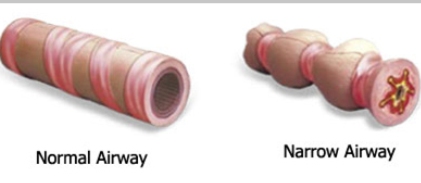Its time to take control of your Asthma………..
Dr Rajesh Swarnakar
Asthma is a chronic respiratory disorder of the lungs in which there is inflammation (swelling) of the airways (breathing tubes) in our lungs. Due to this swelling, the airways are narrowed and the lung becomes vulnerable to various allergens which act as triggers for an asthma attack. Dust, cold, pollen, furry pets, and viruses, smoking and air pollutants, and even emotional agitation act as triggers for an asthma attack. When a person comes in contact with a trigger, the inflamed airways are irritated leading to tightening of the muscles and excess mucus production which further constricts the passages, thereby inhibiting normal breathing and this at times could even turn fatal.
The usual manifestations of asthma are repeated episodes of chest tightness, difficulty in breathing and cough. In children asthma often manifests through a single symptom like cough which is more severe at night or early in the morning and remains persistent despite intake of various cough syrups and medications. Asthma symptoms vary from person to person and it is important to watch them carefully for a correct diagnosis by the doctor.
- Approximately, 300 million people worldwide suffer from asthma, with 250,000 annual deaths attributed to the disease1.
- In 2008, asthma hospitalizations were 1.5 times higher among female than male patients1. (worldwide data)
- More than half (53%) of people with asthma had an asthma attack in 20081. (US data)
- About 1 in 10 children (10%) had asthma and 1 in 12 adults (8%) had asthma in 20091. (US data)
- Acute severe asthma accounts for 5,00,000 hospitalizations worldwide annually².
There are several therapies and forms of treatment for asthma available in the market. It has now been accepted globally that the best and safest way to take asthma medication is by inhalation as it reaches your lungs directly and starts acting immediately. But if you are on tablet or syrup the medication takes time to act as the medicine has to pass from the stomach to the blood and finally to the lungs. This could also result in several side effects. It is to be noted that in inhalation therapy, the dosage needed is up to 50 times lesser than syrups or tablets and far more effective.
According to the GINA Global Strategy for Asthma Management and Prevention (2011), asthma control means that a person with asthma on proper medication has:
- No (or minimal) asthma symptoms.
- No waking at night due to asthma.
- No (or minimal) need to use “reliever” medication.
- The ability to do normal physical activity and exercise.
- Normal (or near-normal) lung function test results
- No (or very infrequent) asthma attacks.
If you are not meeting these goals then your treatment needs alteration,talk to your Doctor as how you can reach these goals and take control of your Asthma.
More than 300 million people around the world have asthma, and the disease imposes a heavy burden on individuals, families, and societies. Asthma control often falls short and there are many barriers to asthma control around the world. Proper long-term management of asthma will permit most patients to achieve good control of their disease. Yet the Global Burden of Asthma Report documents ample evidence that, in many regions around the world, this goal is often not met.
Some people with asthma symptoms may never receive a diagnosis of asthma, and thus do not have the opportunity for good asthma treatment and control. Various factors such as poor access to medical care, underrecognition by health professionals, lack of awareness among patients, and overlap of asthma symptoms with those of other diseases contribute to underdiagnosis of asthma. A simple portable tool called the peak flow meter can help measure the lung power.Spirometry with reversibility test often confirms the diagnosis.
The underuse of inhaled corticosteroids for long-term management of asthma is a particular problem in many regions. These medications diminish chronic swelling in the lungs of asthma patients, and are a key to controlling the disease. It is important to note that these are not the steroids which are used by atheletes for improving performance and are good ones that help in controlling asthma. Inhaled corticosteroids are safe when used as per the recommended doses even if taken for years together.There are studies to prove that declining asthma mortality rates over the last 10 years have been attributed to the increased use of inhaled corticosteroid therapy in areas including Scandinavia, the UK/Republic of Ireland, Western Europe, and Argentina. In Northeast Asia, increased use of inhaled glucocorticosteroids has also led to a reduction in asthma severity.
People with asthma may not understand how to use their medications properly, or may not understand concepts such as asthma control and when to seek help for worsening asthma that would help them manage their disease effectively. Misconceptions about asthma and its treatment are widespread one being that not much can be done with treatment which is absolutely false. A wide range of inhaler devices for delivering anti-asthma medications are available, a clinician can choose the device that suits the patient best. Infact in India we have a wide range of anti-asthma medications to suit every patient at a fraction of their costs abroad.
Finally, people should know that effective asthma treatments exist and with proper diagnosis, education, and treatment, the great majority of asthma patients can achieve and maintain good control of their disease. When asthma is under control, patients can live full and active lives and can prevent visits to the emergency department and hospital.The effective therapy also prevents life threatening asthma attack and costly hospital stay.So don’t underestimate what can be achieved with modern asthma medications and tolerate symptoms of asthma as normal.Go for its total control and breath easy forever.
For more information log on to www.lungscare.com ( The author is Lungs Specialist,a Fellow of American College of Chest Physicians and Director of Getwell Hospital,Dhantoli,Nagpur.He can be reached at drrajeshswarnakar@gmail.com)













